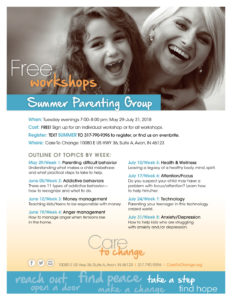“Carter was always a strong-willed child. When he was a toddler, we thought he was just spirited and tough to rein in. School was difficult from the beginning — he just struggled to pay attention, and his teachers asked us to consider medication for ADHD. By his tween years, he was plagued by anxiety, and now he’s a teenager and we don’t know what to do with him. We’re a strong family and we’ve raised him in a Christian home, but it seems like nothing works. We’re tearing our hair out. What did we do wrong?”
We frequently see parents like Carter’s. They seem to have done everything the best they know how, and for whatever reason, things just don’t turn out like they’d prayed. They’re frustrated and desperate, privately worried that serious issues like addiction and suicide may be ahead for their child.
“The pregnancy? Oh, it was the worst I had. I was so sick for the first six months, and I spent the last month on bedrest. The delivery took nearly 24 hours, and then they had to do an emergency C-section. Carter was a sickly baby, too. He had three hospital stays by his second birthday. Now he seems perfectly healthy, but we were always afraid.”
In recent years, neuroscientists have learned much about brain development and how it’s affected by trauma. Children who experience trauma at an early age fall into a predictable pattern that worsens without intervention. When we think about trauma, the obvious examples are abuse, neglect, and being in foster care. Those don’t apply to Carter and his family. But there are other forms of trauma that can have the same kind of impact: in utero exposure to stress, a difficult delivery, and early medical intervention.
Carter checks off all three boxes. In each of those conditions, his developing brain was flooded by large amounts of stress hormones such as cortisol. The environment may have been a loving one, but the brain responded just as it would have to an abusive situation. In simple terms, those early experiences rewired his brain, and his parents are now seeing the results.
The good news is that our brains are highly plastic, which means that they can be altered with the right strategies and nutrition. We use an evidence-based process known as Trust-Based Relational Intervention (TBRI) to help parents provide the support their children need. TBRI has been proven to work in foster homes and residential youth facilities, as well as in everyday families. I’ll explain more at the next installment of our Summer Parenting Series on Tuesday, May 29 at 7 p.m.. I’ll describe TBRI in easy-to-understand ways and show you how you can put that knowledge to use. The workshop is free, but you’ll need to reserve your seat.
Carter’s parents weren’t at fault for what happened to his brain chemistry, but they were able to use TBRI to help him to a brighter future and create a calmer home. If you’d like to discuss your own child’s challenges, set a time to sit down with one of our counselors.
